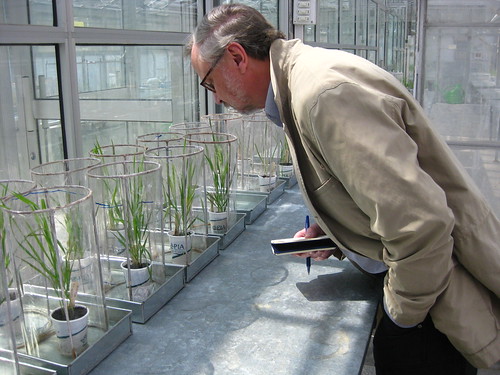
USDA is one of the world’s leading scientific research institutions for agriculture, food and nutrition. We also have the largest forestry research resource in the world. At just one USDA agency – the Agriculture Research Service - more than 2,000 scientists publish more than 4,000 research papers each year in peer-reviewed journals on their work to ensure high-quality, safe, and sustainable food and other agricultural products. This work continues year after year, and the volume and quality of our research is particularly impressive when you consider that overall funding for both public and private spending on food and agriculture research has been stagnant for many years.
Our research extends from the farm field to the kitchen table, and from the air we breathe to the energy that powers our country. Recent work by our researchers has produced a way to use radio frequencies to kill harmful salmonella in eggs; gene silencing technology that controls mosquito populations without harming pollinators; and a new soil nitrogen test that reduces fertilizer application amounts, reduces costs for farmers, and benefits the environment.
USDA works hard to instill a culture of excellence and transparency in our scientific agencies. We take the integrity of our science and the scientists who produce it very seriously. The intent of USDA-supported research is to provide the greatest possible public benefit, and it is critical that this work have the confidence of the scientific community, policy-makers, and the general public. That is why, in response to a presidential memo to all federal departments, USDA in May 2013 implemented a strong, comprehensive, department-wide scientific integrity policy that ensures the highest level of honesty and thoroughness in all aspects of our scientific and technological processes and analyses. The regulations established for the first time a Scientific Integrity Officer for all of USDA and a clear, uniform process whereby employees and contractors can take action if they feel scientific integrity has been compromised.
Because of this, when concerns are raised about the integrity of USDA science and research, we have a process in place to investigate the issue and address it when warranted. We also published a scientific integrity handbook that provides clear instruction and guidance on the policies and processes to departmental leadership, employees, and contractors on how they can maintain the highest levels of scientific integrity and how they can take action to preserve those standards.
The regulation and handbook will help ensure that the science upon which our policy makers, our stakeholders and the public all rely is performed and delivered with integrity, and that the actions of employees and contractors while pursuing peer reviewed reliable investigations are conducted without interference.
USDA is committed to maintaining scientific integrity, through a process that protects not only our research scientists, but the scientific process that gives their work credibility. We remain dedicated to excellence, transparency, and cutting-edge scientific research.
